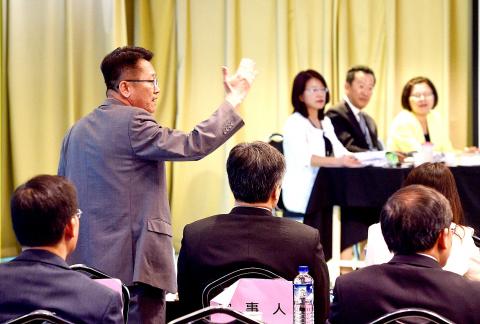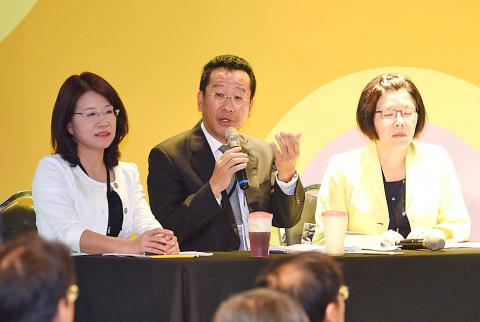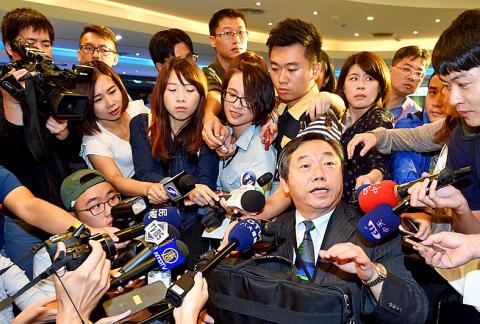Representatives of the Chinese Nationalist Party (KMT) and the KMT-owned Central Investment Co (中央投資公司) yesterday criticized the Act Governing the Handling of Ill-gotten Properties by Political Parties and Their Affiliate Organizations (政黨及其附隨組織不當取得財產處理條例) as unconstitutional and protested what they said were flaws in a hearing arranged by the Ill-gotten Party Assets Settlement Committee .
The committee yesterday held a hearing in Taipei to determine whether Central Investment Co and its subsidiary Hsinyutai Co (欣裕台) should be considered KMT affiliate organizations; whether Central Investment Co president Gordon Chen (陳樹) and four other listed shareholders acquired their shares via a KMT-established trust; whether the KMT’s shares in the two firms were ill-gotten assets; and whether those shares should be transferred to the nation, local governments and the shareholders from whom the KMT allegedly acquired them.
During a committee question-and-answer session, Chen and a Central Investment accountant confirmed that the KMT is the sole shareholder in the two firms.

Photo: Peter Lo, Taipei Times
Shortly after the hearing began, Chen requested that committee chairman Wellington Koo (顧立雄) and vice chairman Shih Chin-fang (施錦芳) leave, citing a conflict of interest stemming from “biased” remarks the two have made against his firm.
The rest of the committee members rejected Chen’s request after an impromptu meeting, saying that Koo’s and Shih’s remarks were based on available investigative results, and that the information gathered at the hearing would not be the only reference in the committee’s decisions on whether to take punitive measures against the firms.
KMT Administration and Management Committee director Chiu Da-chan (邱大展) protested against the hearing before it had started.

Photo: Peter Lo, Taipei Times
“Everyone already knows the results before the hearing. The plaintiffs and judges are from the same group,” Chiu said.
Saying that the committee comprises Democratic Progressive Party (DPP) proponents, he called on the Council of Grand Justices to deliver an impartial ruling on the legitimacy of the act, in reference to a constitutional interpretation the KMT requested last month.
Chiu said that the KMT would renounce land it holds if the land is ruled to be ill-gotten, but it would be committing malfeasance and painted in a negative light if it agreed to have its assets confiscated according to an unconstitutional act.

Photo: Peter Lo, Taipei Times
He said that the KMT is a defender of the law and the Constitution.
“Can we call ourselves a lawful political party if we do not even obey the Constitution?” he said.
Chiu said that the KMT lawfully registered the land it possesses, but that under the act, anyone who has purchased land since 1945 could be investigated and stripped of their property.
He questioned whether calling Central Investment a KMT affiliate organization can be justified.
“If so, 41 companies in which the government has shares should be deemed state-run corporations,” he said. “If you reveal the names of those companies now, I guarantee that the nation’s stock market will suffer a major decline tomorrow.”
Chang Shao-teng (張少騰), a lawyer representing the KMT, said that since the committee only informed the KMT of the types of assets it should declare on Tuesday, it is impossible that the KMT could have collated all of the requested information.
He said that there is a lack of legal basis for determining whether the two firms are KMT affiliate organizations, as the enforcement rules for the act have not been approved by the Executive Yuan.
The committee later inquired into the company’s finances dating to 1971.
Koo said that Central Investment bought NT$200 million (US$6.35 million) worth of KMT-issued government securities shortly after it was founded.
He asked Chen if the company had paid the then-KMT administration the money, or if the KMT took directly from the nation’s coffers and how the company acquired the money if it had actually bought the securities.
Chen said that he was unable to provide an answer, as he only assumed office in July last year and did not have access to the information Koo requested.
Koo later asked Chen and Chiu questions about Chiloo Industries Co (齊魯公司), in which Central Investment bought shares in 2007 and which runs Tsingtao Brewery Co (青島啤酒).
A committee member asked Chen why Central Investment enjoyed the privilege of buying large amounts of shares in petrochemical, electronics and concrete companies in its early years and how it managed to accrue considerable profits.
Other committee members questioned Chen about why the KMT asked him to head the company, how top KMT officials came to the decision to hire him and how much he is paid.
National Chong Cheng University history professor Yang Wei-chen (楊維真), who served as one of the KMT’s “witnesses,” said that the committee had turned the hearing into an inquest and that its style of questioning was based on a “presumption of guilt.”
“If the people summoned refuse to answer a question, they would be presumed guilty, and if they comply, they would be forced to forfeit their right to remain silent,” Yang said.
“As a witness, I cannot put up with a hearing like this,” he said before walking out.
Koo said that if the committee decides to hold another hearing, it would deliberate over the need to hold a pre hearing to determine whether the KMT’s stakes in the two firms are legitimate.
He said that as a governing body, the committee has the authority to interpret and enforce the act within legal parameters.

Taiwanese actress Barbie Hsu (徐熙媛) has died of pneumonia at the age of 48 while on a trip to Japan, where she contracted influenza during the Lunar New Year holiday, her sister confirmed today through an agent. "Our whole family came to Japan for a trip, and my dearest and most kindhearted sister Barbie Hsu died of influenza-induced pneumonia and unfortunately left us," Hsu's sister and talk show hostess Dee Hsu (徐熙娣) said. "I was grateful to be her sister in this life and that we got to care for and spend time with each other. I will always be grateful to

REMINDER: Of the 6.78 million doses of flu vaccine Taiwan purchased for this flu season, about 200,000 are still available, an official said, following Big S’ death As news broke of the death of Taiwanese actress and singer Barbie Hsu (徐熙媛), also known as Big S (大S), from severe flu complications, the Centers for Disease Control (CDC) and doctors yesterday urged people at high risk to get vaccinated and be alert to signs of severe illness. Hsu’s family yesterday confirmed that the actress died on a family holiday in Japan due to pneumonia during the Lunar New Year holiday. CDC Deputy Director-General Tseng Shu-hui (曾淑慧) told an impromptu news conference that hospital visits for flu-like illnesses from Jan. 19 to Jan. 25 reached 162,352 — the highest

TAIWAN DEFENSE: The initiative would involve integrating various systems in a fast-paced manner through the use of common software to obstruct a Chinese invasion The first tranche of the US Navy’s “Replicator” initiative aimed at obstructing a Chinese invasion of Taiwan would be ready by August, a US Naval Institute (USNI) News report on Tuesday said. The initiative is part of a larger defense strategy for Taiwan, and would involve launching thousands of uncrewed submarines, surface vessels and aerial vehicles around Taiwan to buy the nation and its partners time to assemble a response. The plan was first made public by the Washington Post in June last year, when it cited comments by US Indo-Pacific Commander Admiral Samuel Paparo on the sidelines of the Shangri-La Dialogue

Suspected Chinese spies posing as Taiwanese tourists have been arrested for allegedly taking photographs of Philippine Coast Guard ships, local media reported. The suspected spies stayed at a resort in Palawan, where from a secluded location they used their phones to record coast guard ships entering and leaving a base, Philippine TV network GMA said on Wednesday. Palawan is near the Spratly Islands (Nansha Islands, 南沙群島) and other disputed areas of the South China Sea, where tensions have been on the rise between China and the Philippines. The suspects allegedly also used drones without permission and installed cameras on coconut trees in the